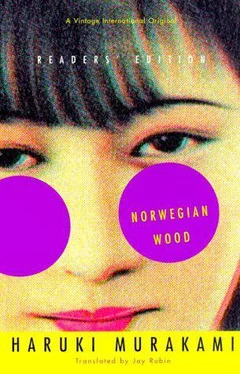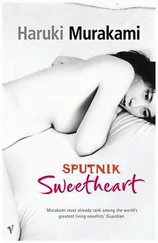Nights when it was impossible for me to sleep, images of Naoko would come back to me. There was no way I could stop them. Too many memories of her were crammed inside me, and as soon as one of them found the slightest opening, the rest would force their way out in an endless stream, an unstoppable flood: Naoko in her yellow raincape cleaning the aviary and carrying the feed bag that rainy morning; the caved-in birthday cake and the feel of Naoko's tears soaking through my shirt (yes, it had been raining then, too); Naoko walking beside me in winter wearing her camel-hair coat; Naoko touching the hairslide she always wore; Naoko peering at me with those incredibly clear eyes of hers; Naoko sitting on the sofa, legs drawn up beneath her blue nightdress, chin resting on her knees.
The memories would slam against me like the waves of an incoming tide, sweeping my body along to some strange new place - a place where I lived with the dead. There Naoko lived, and I could speak with her and hold her in my arms. Death in that place was not a decisive element that brought life to an end. There, death was but one of many elements comprising life. There Naoko lived with death inside her. And to me she said, "Don't worry, it's only death. Don't let it bother you."
I felt no sadness in that strange place. Death was death, and Naoko was Naoko. "What's the problem?" she asked me with a bashful smile, "I'm here, aren't I?" Her familiar little gestures soothed my heart like a healing balm. "If this is death," I thought to myself, "then death is not so bad."
"It's true," said Naoko, "death is nothing much. It's just death.
Things are so easy for me here." Naoko spoke to me in the spaces between the crashing of the dark waves.
Eventually, though, the tide would pull back, and I would be left on the beach alone. Powerless, I could go nowhere; sadness itself would envelop me in deep darkness until the tears came. I felt less that I was crying than that the tears were simply oozing out of me like perspiration.
I had learned one thing from Kizuki's death, and I believed that I had made it a part of myself in the form of a philosophy: "Death exists, not as the opposite but as a part of life."
By living our lives, we nurture death. True as this might be, it was only one of the truths we had to learn. What I learned from Naoko's death was this: no truth can cure the sadness we feel from losing a loved one. No truth, no sincerity, no strength, no kindness, can cure that sorrow. All we can do is see that sadness through to the end and learn something from it, but what we learn will be no help in facing the next sadness that comes to us without warning. Hearing the waves at night, listening to the sound of the wind, day after day I focused on these thoughts of mine. Knapsack on my back, sand in my hair, I moved farther and farther west, surviving on a diet of whisky, bread and water.
One windy evening, as I lay wrapped in my sleeping bag, weeping, by the side of an abandoned hulk, a young fisherman passed by and offered me a cigarette. I accepted it and had my first smoke in over a year. He asked why I was crying, and almost by reflex I told him that my mother had died. I couldn't take the sadness, I said, and so I was on the road. He expressed his deep sympathy and brought a big bottle of sake and two glasses from his house.
The wind tore along the sand beach as we sat there drinking. He told me that he had lost his mother when he was 16. Never healthy, she had worn herself out working from morning to night. I half-listened to him, sipping my sake and grunting in response every now and then. I felt as if I were hearing a story from some far-off world. What the hell was he talking about? I wondered, and all of a sudden I was filled with intense rage: I wanted to strangle him. Who gives a shit about your mother? I've lost Naoko! Her beautiful flesh has vanished from this world! Why the hell are you telling me about your fucking mother?!
But my rage disappeared as quickly as it had flared up. I closed my eyes and went on half-listening to the fisherman's endless talk.
Eventually he asked me if I had eaten. No, I said, but in my rucksack I had bread and cheese, a tomato and a piece of chocolate. What had I eaten for lunch? he asked.
Bread and cheese, tomato and chocolate, I answered. "Wait here," he said and ran off. I tried to stop him, but he disappeared into the darkness without looking back.
All I could do was go on drinking my sake. The shore was littered with paper flecks from fireworks that had been exploded on the sand, and waves crashed against the beach with a mad roar. A scrawny dog came up wagging its tail and sniffing around my little campfire for something to eat but eventually gave up and wandered away.
The young fisherman came back half an hour later with two boxes of sushi and a new bottle of sake. I should eat the top box straight away because that had fish in it, he said, but the bottom box had only nori rolls and deep-fried tofu skins so they would last all tomorrow. He filled both our glasses with sake from the new bottle. I thanked him and polished off the whole top box myself, though it had more than enough for two. After we had drunk as much sake as we could manage, he offered to put me up for the night, but when I said I would rather sleep alone on the beach, he left it at that. As he stood to go, he took a folded ?5,000 note from his pocket and shoved it into the pocket of my shirt. "Here," he said, "get yourself some healthy food.
You look awful." I said he had done more than enough for me and that I couldn't accept money on top of everything else, but he refused to take it back. "It's not money," he said, "it's my feelings. Don't think about it too much, just take it." All I could do was thank him and accept it.
When he had gone, I suddenly thought about my old girlfriend, the one I had first slept with in my last year of school. Chills ran through me as I realized how badly I had treated her. I had hardly ever thought about her thoughts or feelings or the pain I had caused her. She was such a sweet and gentle thing, but at the time I had taken her sweetness for g ranted and later hardly gave her a second thought.
What was she doing now? I wondered. And had she forgiven me?
A wave of nausea came over me, and I vomited by the old ship. My head hurt from too much sake, and I felt bad about having lied to the fisherman and taken his money. It was time for me to go back to Tokyo, I decided; I couldn't keep this up for ever. I stuffed my sleeping bag into my rucksack, slipped my arms through the straps and walked to the local railway station. I told the man at the ticket- office window that I wanted to get to Tokyo as soon as possible. He checked his timetable and said I could make it as far as Osaka by morning if I transferred from one night train to another, then I could take the bullet train from there. I thanked him and used the x"5,000 note the fisherman gave me to buy a ticket to Tokyo. Waiting for the train, I bought a newspaper and checked the date: 2 October, 1970. So I had been travelling for a full month. I knew I had to go back to the real world.
The month of travelling neither lifted my spirits nor softened the blow of Naoko's death. I arrived back in Tokyo in pretty much the same state in which I had left. I couldn't even bring myself to phone Midori.
What could I say to her? How could I begin? "It's all over now; you and I can be happy together"? No, that was out of the question.
However I might phrase it, though, the facts were the same: Naoko was dead, and Midori was still here. Naoko was a mound of white ash, and Midori was a living, breathing human being.
I was overcome with a sense of my own defilement. Though I returned to Tokyo I did nothing for days but shut myself up in my room. My memory remained fixed on the dead rather than the living.
Читать дальше












